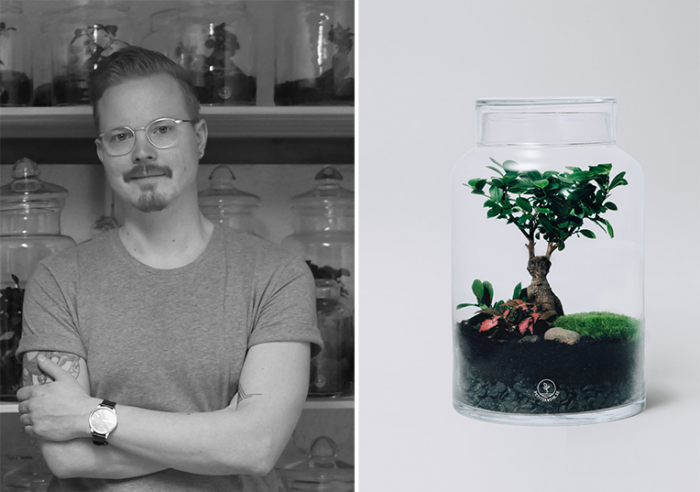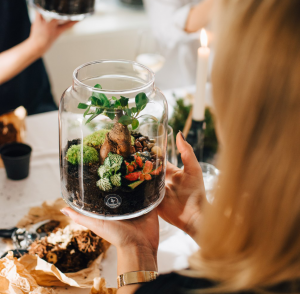
Tell us about Petit Jardin AB, how did it all start?
I have always had a great interest in plants and design. I have my origins in France, Sweden and Finland, and during a trip to France I discovered self-sufficient ecosystems for the first time. I could not understand how it was possible that the plants could be self-sufficient and not need watering, it was almost magical, I thought! The idea to start a company and start manufacturing ecosystems in Sweden, came after much frustration that my healthy and lush plants did not survive the winter in Sweden. I constantly needed to buy new plants and after discussion with plant growers understood how unsustainable the plant industry really is. This led me to start experimenting with my own ecosystems. Petit Jardin now employs biologists from Stockholm University who develop and build our ecosystems in our studio in Älvsjö. Our vision is to combine the raw beauty of nature with refined interior design and create a healthier living and working space.
What type of products do you sell and what market do you turn to?
We sell self-sufficient plant ecosystems that we call a Petit Jardin (which means small garden in French), which means that the plants that we plant in a glass jar and that basically do not need any maintenance. A mini-water cycle is formed in the glass jar, which means that the plants use the water in the glass jar over and over again – and create their own oxygen. It is really fun that we are the first in Sweden to manufacture ecosystems and are now available at a number of retailers, such as NK in Stockholm and Gothenburg. We turn to the interior design industry and look at our products as interior details rather than plants. We have also started with workshops, where participants build their own self-sufficient plant ecosystems, which we hold physically or digitally. We see it as an exciting and sustainable activity, fun and creative, but also reminiscent of reducing our consumption and reusing resources. In this workshop, each participant, with the help of guidance from our plant biologist, will learn how to create their own handmade ecosystem. You learn the science behind the concept, how plants can be self-sufficient in an ecosystem, and how to manage them. All necessary materials are delivered to the participants in advance (glass jar, plants, moss, special soil, stones…). It had been incredibly popular, despite the pandemic, with customers like Google and Mojang taking over – we are so happy about that!

Foto: A workshop with Petit Jardin
What do you think is the most important thing in the meeting with the buyer?
I always try to bring an ecosystem to the customer meeting. You get a completely different impression when you see a Petit Jardin in real life! The condensation in the jar, the plants with their strong colors that thrive so well inside. Since the buyer has usually not seen a similar product before, the most important message is to get through is that it is really about a self-sufficient ecosystem, which means that they are real plants that do not need any maintenance. We have also seen that customers become very interested in the sustainability aspect as well and companies are particularly interested in how ecosystems can contribute to their sustainability work and initiatives.
How do you work at Petit Jardin AB with sustainability?
This is of course a very important aspect for us and has been so since the beginning. The fact that our ecosystems can live for several years and do not need to be watered reduces the customer’s consumption, which contributes to a more sustainable society. The plant industry is very unsustainable with most potted plants dying within a few months and consumers buying new plants continuously, which in turn has been transported a long way. We have seen that our ecosystems also replace cut flowers, which last for just under a week. We apply nearshoring* as much as we can and buy all material as close as we can. We also do not use chemicals in the ecosystems, so they are 100% natural.
If you were to look into the future, what do you think the development looks like for the interior design industry?
We have seen that sustainability is playing an increasing role in the industry, with customers becoming more and more aware of the environment and their consumption. An example is a growing interest in second-hand interior details or furniture (which is also called preloved, for example). People are also starting to realize that it is better for the environment to buy high-quality products, because they last much longer. We believe that the trend will continue for a long time to come and customers will have stronger demands that their products be developed, manufactured and shipped in a sustainable way. We see Petit Jardin as our small sustainable effort in the interior design and plant industry.
* Nearshoring means that you move part of your business to countries that are close to the country where the company is run.
Petit Jardin on sociala media
Instagram: @petitjardin.se
Facebook: @petitjardin.se